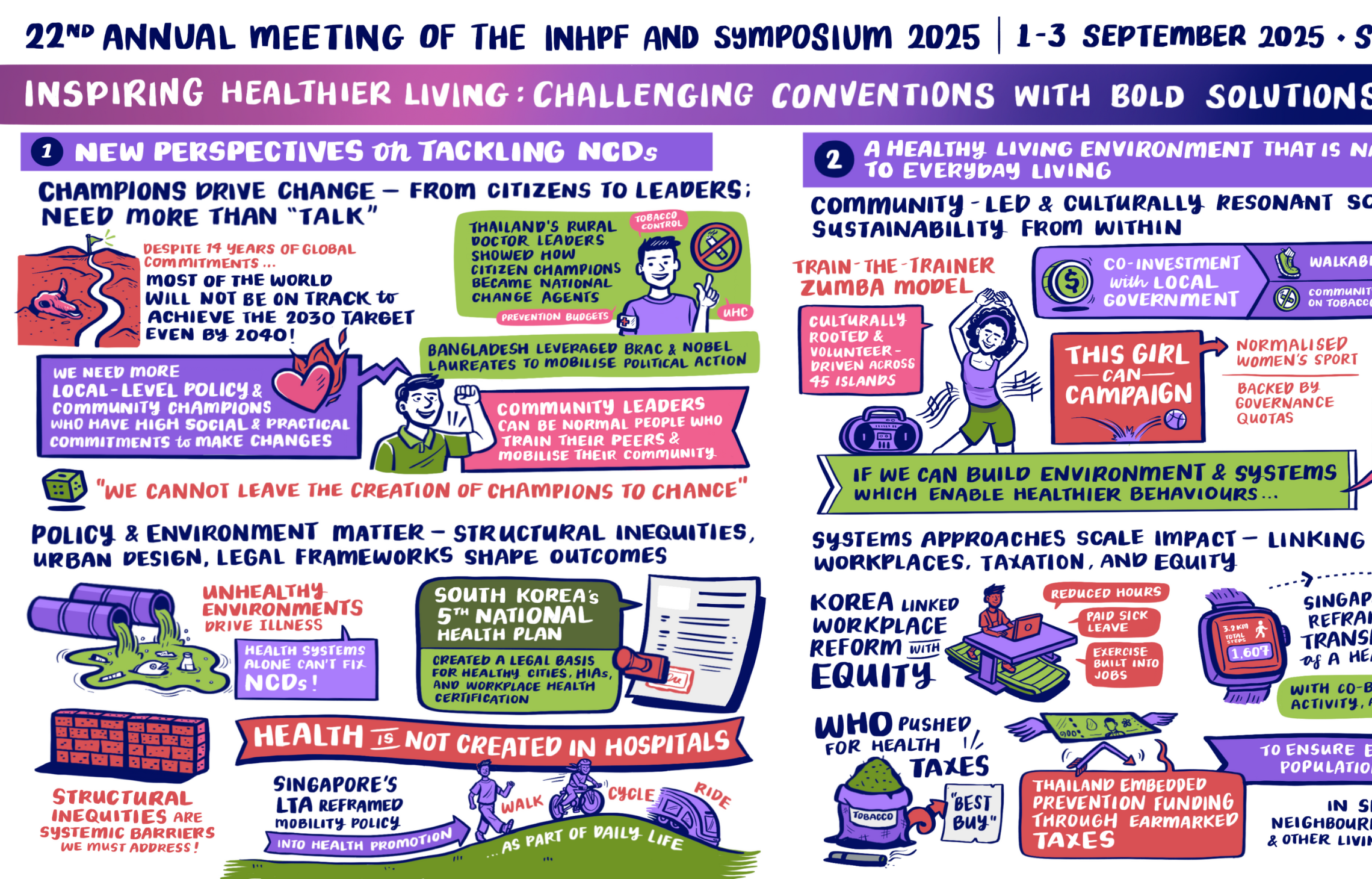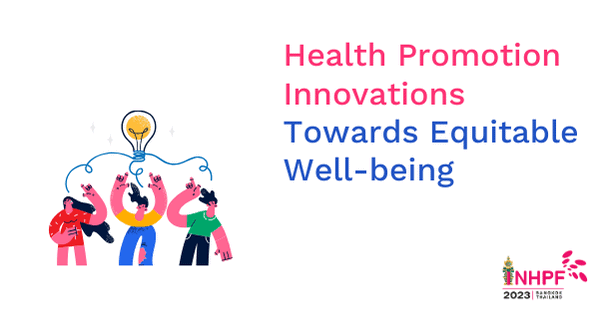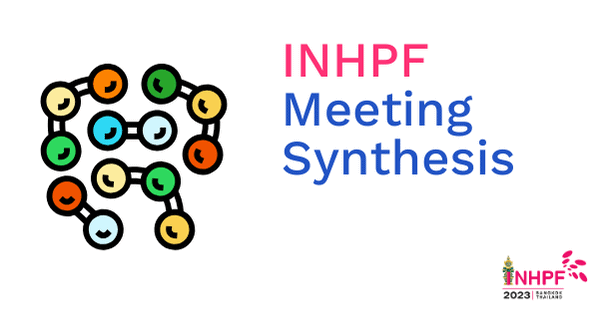About the 22nd INHPF Annual Meeting and Symposium
The 22nd Annual Meeting and Symposium of the International Network of Health Promotion Foundations (INHPF) was held from 1 to 3 September 2025 in Singapore, hosted by the Health Promotion Board (HPB) Singapore under the theme “Inspiring Healthier Living: Challenging Conventions with Bold Solutions.”
The meeting brought together health promotion leaders from across the Asia-Pacific region to exchange experiences, strengthen collaboration, and explore innovative approaches to advance health and equity.
Highlights and Key Takeaways
The key takeaways, drafted by HPB Singapore based on the rich discussions and insights shared during the sessions, highlight shared directions for collective action — from tackling noncommunicable diseases (NCDs) and creating supportive environments to fostering community leadership, data-driven policies, and inclusive health systems.
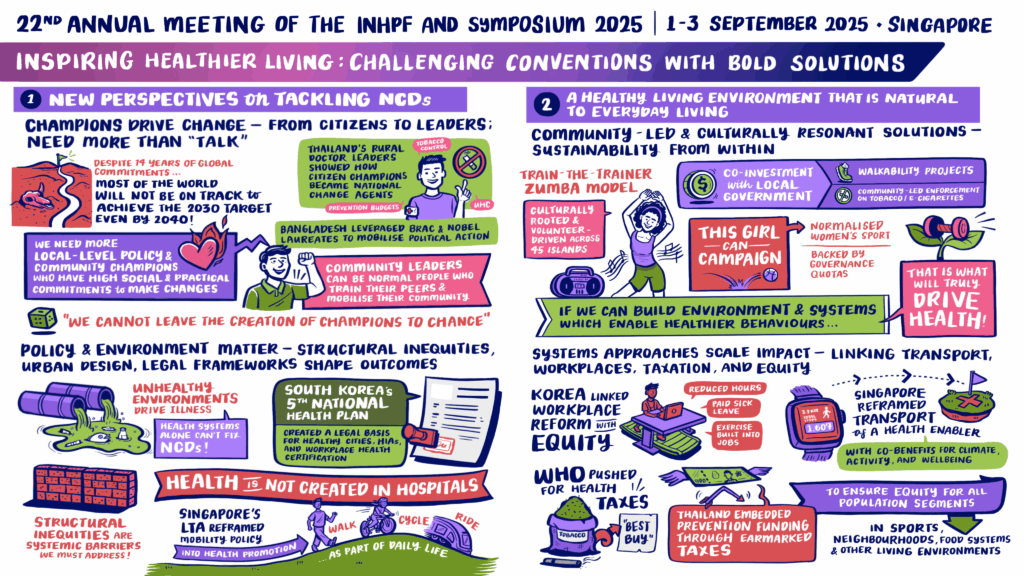
Day 1 Summary:
Discussions on Day 1 focused on built environments, active living, and system-level reforms. Members showcased how policies such as food marketing restrictions, healthier procurement standards, and integrated transport and urban planning can make healthy choices easier and more accessible for all. These dialogues emphasized that reshaping everyday environments is essential to reduce NCD burdens and health inequities.
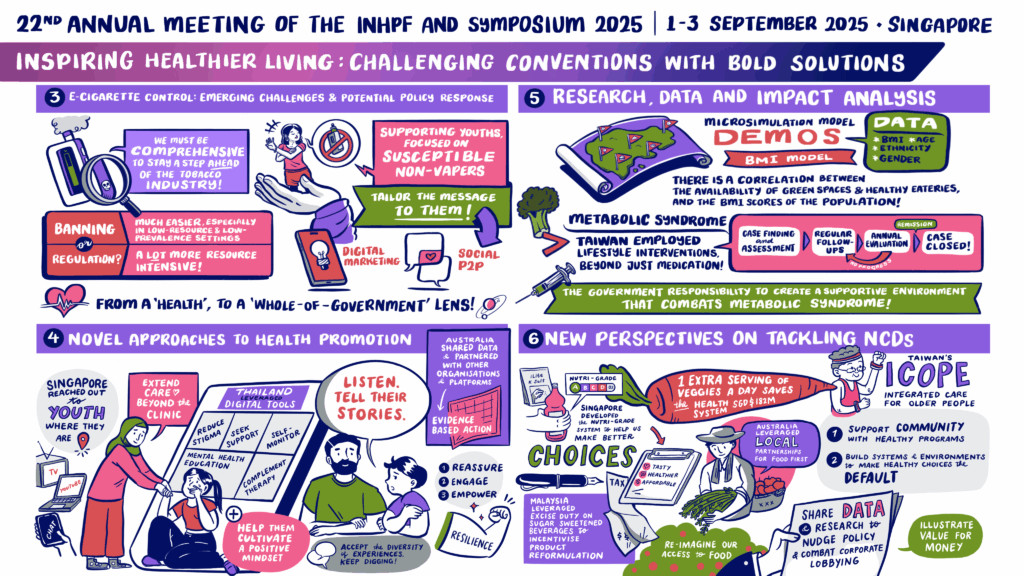
Day 2 Summary:
Day 2 focused on equity, partnerships, and community leadership. Members shared experiences in empowering local initiatives, supporting vulnerable populations, and translating research into practice through cross-sector collaboration. The session highlighted how Health Promotion Foundations (HPFs) can accelerate progress when communities, governments, and partners lead together toward shared health goals.
These messages reflect the collective efforts and commitments of Health Promotion Foundations (HPFs) to turn knowledge into impact and build healthier, fairer communities worldwide.
Key Themes Discussed
The 22nd INHPF Annual Meeting and Symposium explored how Health Promotion Foundations (HPFs) can accelerate progress toward healthier, fairer societies through community action, system reform, and evidence-based innovation. Nine interconnected themes emerged across the three-day discussions.
1. From commitment to action:
Members agreed that reducing NCDs requires more than national targets—it needs champions at community and local levels who can drive change from the ground up.
2. Environments that shape health:
Health is not created in hospitals but through policies and urban systems that make healthy living the easy choice. Countries shared approaches such as health taxes, active city design, and workplace health certification.
3. Community-led and culturally rooted approaches:
Solutions built with and by communities—like TongaHealth’s Train-the-Trainer Zumba, VicHealth’s This Girl Can, and ThaiHealth’s Good Walk—demonstrated how local leadership sustains real behavior change.
4. Whole-of-system policies:
Members highlighted the need to connect health with transport, housing, taxation, and education systems. Cross-sector collaboration was seen as essential to tackling the structural inequities behind poor health outcomes.
5. Data and innovation for impact:
Countries shared examples of data-driven strategies, from microsimulation modeling and digital mental health tools to integrated monitoring systems that guide policy decisions.
6. Equity and inclusion as shared goals:
HPFs reaffirmed that addressing structural inequities—across income, geography, gender, and culture—must remain central to health promotion.
Together, these discussions underscored that lasting change depends on empowered communities, enabling environments, and whole-of-government leadership—working in harmony to turn evidence into impact.
Site Visits – From Discussion to Real-World Practice
The meeting concluded with three optional site visits that brought the week’s discussions to life. Delegates explored Singapore’s built environments and community-based health systems—seeing how policy translates into practice.
At Punggol District, hosted by the Land Transport Authority (LTA), participants observed how the city’s car-lite vision and integrated design for walking and cycling foster active living and community connection. At Jurong Lake Gardens, hosted by the National Parks Board (NParks), the Parks for Health framework came alive through therapeutic landscapes and co-created green spaces that support mental restoration and social resilience. Meanwhile, a visit to an Active Ageing Centre, hosted by HPB Singapore, showcased how Age Well SG turns healthy ageing into reality through inclusive programmes, social engagement, and preventive health services for seniors.
Together, these visits demonstrated how Singapore’s policies on urban design, nature, and aging are creating environments that make health a part of daily life—reinforcing the INHPF vision of turning knowledge into impact.
Appreciation and Acknowledgement
INHPF extends its sincere appreciation to HPB Singapore for hosting the meeting and preparing the key takeaways that capture the spirit of collaboration and innovation shared among all participants.
Downloads
Key Takeaways (Visual Summary – PDF)
Explore Related Initiatives
👉 Annual Meeting 2025 – Photo Highlights
👉 Healthy Eating Report Card 2025 (PDF)

